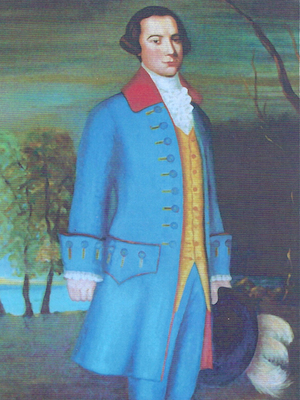 Robert Carter the Councillor was born in February 1728, son of Robert and Priscilla (Churchill) Carter and grandson of Robert (“King”) Carter (q.v.) He attended the College of William and Mary, spent 1749-51 in England, and on his return married on April 5, 1754, Frances Tasker, youngest daughter of Benjamin Tasker of Maryland. The couple resided in Nomini Hall, Westmoreland County. Details of their domestic life are recorded in the journal of Philip Fithian, a young tutur who spent a year in the Carter household.
Robert Carter the Councillor was born in February 1728, son of Robert and Priscilla (Churchill) Carter and grandson of Robert (“King”) Carter (q.v.) He attended the College of William and Mary, spent 1749-51 in England, and on his return married on April 5, 1754, Frances Tasker, youngest daughter of Benjamin Tasker of Maryland. The couple resided in Nomini Hall, Westmoreland County. Details of their domestic life are recorded in the journal of Philip Fithian, a young tutur who spent a year in the Carter household.
In March 1758, he was appointed to the Colonial Council, and three years later he took up residence in Williamsburg. With the waning influence of the Tidewater aristocracy and the Council that they controlled, Carter began to find public life less congenial. In 1771, he returned to Nomini Hall and thereafter rarely attended meetings of the Council.
Opposed to separation from England, he nonetheless supported the American cause once independence was declared.
After the Revolution, Carter devoted himself to his large estates, to the manufacture of iron and textiles, and to philosophical inquiry. Much given to religious speculation, he embraced successfully Anglicanism, Deism, the Baptist faith, Arminianism, and Swedenborgianism.
Opposed in principle to slavery, he freed over the years a large number of his slaves. Carter spent the final ten years of his life in Baltimore. He wife, who died in 1787, bore him twelve children.
